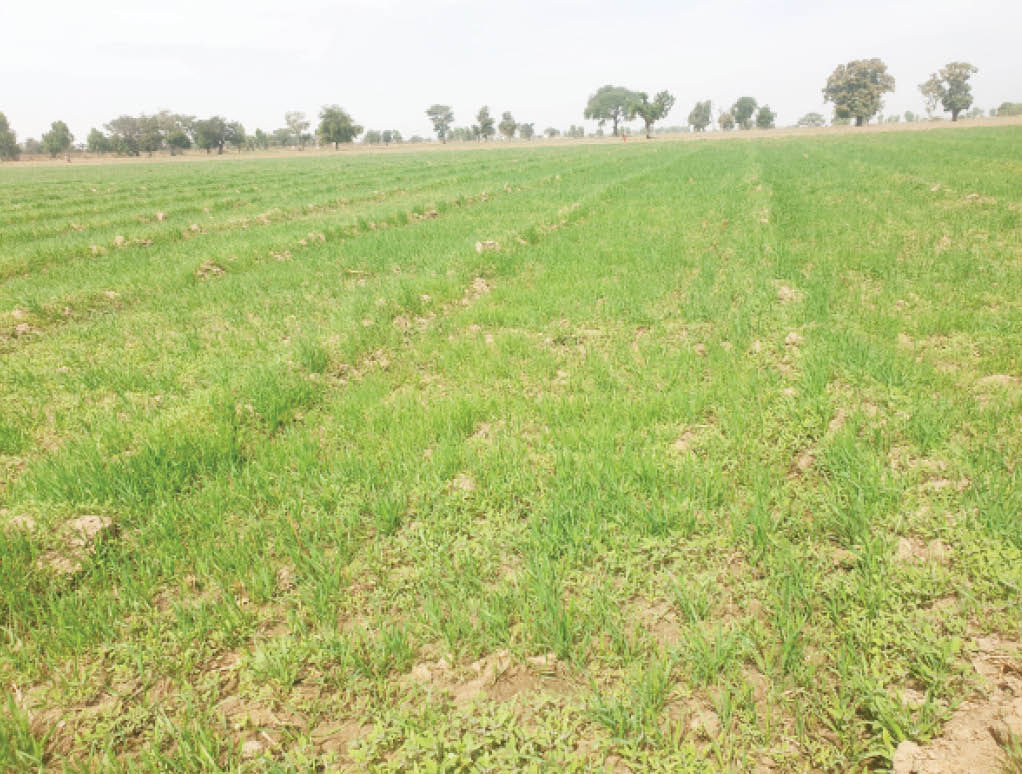Why wheat farm size shrinks Sokoto
The high cost of inputs as a result of consistent naira devaluation experienced in the country is threatening wheat production in Sokoto State. Our reporter gathered that the situation, coupled with the high cost of fuel and insecurity, has forced about 72 per cent of the farmers out of business. The chairman, Wheat Farmers Association […]

One of the wheat farms
The high cost of inputs as a result of consistent naira devaluation experienced in the country is threatening wheat production in Sokoto State.
Our reporter gathered that the situation, coupled with the high cost of fuel and insecurity, has forced about 72 per cent of the farmers out of business.
The chairman, Wheat Farmers Association in the state, Muhammadu Marafa, described the development as discouraging, and expressed fear about the sustainability of wheat farming in the state and the country at large if the situation is allowed to persist.
“Just imagine, a bag of fertiliser is over N30,000 now and the cost of seed has also tripled.
- Budget padding allegation: BudgIT backs Ningi as opposition knocks Senate
- Ramadan: Life USA food basket benefits 150 women in Nasarawa
“I spend N10,000 every day to buy fuel and water my farm. I need 100 bags of fertilizer but I was able to purchase only 50 bags because of its outrageous price now.
“In fact, I only cultivated one-third (1/3) of my farmland because of these challenges.
“We are not getting any support from government the way rice farmers have been getting.
“It is like our government is not interested in local wheat production. It prefers to expend huge amounts of money on wheat importation because that provides them with an avenue to siphon dollars,” he alleged.
According to the Central Bank of Nigeria, $2 billion is spent on the importation of wheat from other countries annually.
Marafa who is also the district head of Malika, further stated that, “if you ply Goronyo road, you will see trucks in their hundreds loaded with rice because of the intervention of the government”. This is what we want.
“But all the support we are getting is from private organizations, which usually comes with problems.
“It usually comes when the season is halfway gone and this leads to low yield to the extent that our members find it difficult to settle their debt.
“As I am talking to you now, some of our members are still paying the loans they collected two years ago because the intervention came very late and the yield was nothing to write home about.
“Some of them collected 10 bags but they yielded between four and five bags at the end of the season.
“The (creditors) are aware of their predicament because they had been sending their supervisors to them, yet they insisted on getting their money back full.
“That is why I never encourage our members to accept their intervention, because it doesn’t come in good time.
“ They have been coming to me with their intervention, I always reject it and they know why.
“I equally tell my people the implications of accepting their support when the season is already halfway, some heed my advice and some ignore it and they are now paying the price,” he said.
“What is more worrisome is that they give our farmers seeds, fertilizers and pumping machines at a very high cost but buy their goods at a very low price,” he lamented.
The Secretary of the association, Yusuf Bello, told Daily Trust that the companies had during their intervention given a bag of wheat (seed) “to our farmers at the cost of N46,000 but bought their goods at N28,000 per bag.
“That was why they rejected their intervention this year because they buy their produce at a loss.
“We thank God that the market is now open for other companies which are coming in to uptake our goods at a reasonable cost,” he said.
On the way forward, the chairman said, there was a need for a marketing board for wheat in the country, and that the government needed to subsidize inputs for farmers as that would encourage people to go back to the farm and also crash prices of goods.
Malam Muhammadu who is a wheat farmer in Wamakko LGA, while speaking on their challenges, said they need urgent intervention from the government if they are to remain in business.
“We need improved seeds; adequate and subsidized fertilizer; and off-takers who can offer good prices,” he said.
Another wheat farmer, Malam Sani, who corroborated this, appealed to the state government to provide farmers, especially wheat farmers, with modern equipment and inputs which he said would boost wheat farming and make it attractive in the state.
